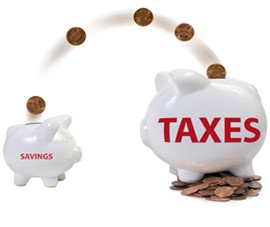How You Can Save Tax By Term Insurance Plan

Paying Income tax seems to be too perplexing when you work hard and have to pay a lot of income tax. Term insurance plans proved to be a great help when you look for saving taxes. It is the simplest form of Life Insurance policy. They are beneficial in terms of immense flexibility, financially economical as they offer low premiums with high levels of sum assured. To avail of tax benefits, it is essential to know which sections of the Income-tax Act apply to the term plan.

How Term Insurance helps to save taxes
To provide tax benefits to people, the Indian government and the Income-tax Department have made provisions for a tax deduction on the policy holder’s term insurance premium payments. The deductions lower the policy holder’s taxable income, so he can save taxes each year till the term plan continues. Under Term Plan, the policyholder can take tax advantages within two sections of the Indian Income Tax Act, 1961.
Under section 80C, the customer would get tax exemptions on the policy premium on purchasing the Term Plan. The Premium payments can be deducted from the customer’s overall income, for the amount of almost Rs, 1.5 lakh in a financial year, but this is applicable only for those who have availed of this policy before 31st march 2012. This is the maximum amount allowed under the combination of Sections 80C, 80CCD (1), and 80CCC. People, who got the policy issued after 1st April 2012, will have 10% tax deduction benefits. The tax deduction can be claimed by the individual, his children, or his spouse.

Under section 10 (10D), the policyholder would receive a maturity advantage on availing of a Term Plan. All insurance policies aim to provide financial support to the beneficiaries in case of an unfortunate incident. In case of the demise of the policyholder, the entire amount is given to the beneficiary without any tax deductions. This is the death benefit exempt from tax, and at the end of the term plan, when the policyholder receives the entire amount, it is also exempt from the tax.
The taxpayer can have tax savings under various sections and sub-sections of Income-tax, as-80C, 80D, 80CCD (1B), and 24 (4). Within his income band. The taxpayer can do maximum investment and save tax. Apart from section 80C, deductions such as under section 80D can be claimed for the payment of health insurance, under section 80EE deduction up to 50,000 on home loan interest can be claimed.
Under section 80 G, donations made to charitable institutions are allowed as a deduction. The insurance companies have their online Premium calculator which gives the correct premium quote based on the policy holder’s age, gender, habits, education, and annual income.
There is no limit on the number of tax-exempt investments but one needs to see how useful these instruments are for tax saving purposes, as the amount of deduction that can be claimed is capped at a maximum value for each instrument